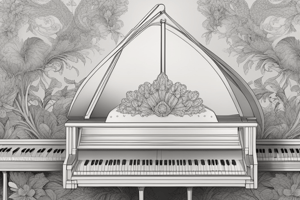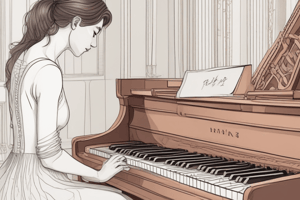Podcast
Questions and Answers
सीखने के दौरान विधार्थी किस कुंजी पर उचित दबाव डालकर संगीत उत्पन्न करते हैं?
सीखने के दौरान विधार्थी किस कुंजी पर उचित दबाव डालकर संगीत उत्पन्न करते हैं?
- कुंजी पर कोई दबाव न डालें
- कुंजी के साथ बहुत अधिक दबाव डालें
- संगीत होने के लिए पर्याप्त दबाव डालें (correct)
- कुंजी पर हल्का दबाव लगाएं
कैसे पिआनो संगीत का सरल संक्रियात्मक स्वरूप कहा जा सकता है?
कैसे पिआनो संगीत का सरल संक्रियात्मक स्वरूप कहा जा सकता है?
- मुस्कुराता
- लेगाटो (correct)
- रुका हुआ
- स्टाकैटो
किस तकनीक में, संगीतीय पंक्तियों में फ्लूइडिटी के भाव को महत्वपूर्ण माना जाता है?
किस तकनीक में, संगीतीय पंक्तियों में फ्लूइडिटी के भाव को महत्वपूर्ण माना जाता है?
- लेगाटो (correct)
- हरिस
- स्टाकैटो
- मुरली
पिआनो संगीत में कौनसा संक्रियात्मक स्वर होता है?
पिआनो संगीत में कौनसा संक्रियात्मक स्वर होता है?
'मस्तर करना' प्रक्रिया में, पिआनो संगीत में क्या प्रमुखता है?
'मस्तर करना' प्रक्रिया में, पिआनो संगीत में क्या प्रमुखता है?
'लेगाटो' और 'स्टाकैटो' में, किसमें अर्थपूर्ण अंतर है?
'लेगाटो' और 'स्टाकैटो' में, किसमें अर्थपूर्ण अंतर है?
सारणियों और आर्पेजियो का अभ्यास किस लक्ष्य के लिए महत्वपूर्ण है?
सारणियों और आर्पेजियो का अभ्यास किस लक्ष्य के लिए महत्वपूर्ण है?
साइट रीडिंग क्या सुनिश्चित करता है?
साइट रीडिंग क्या सुनिश्चित करता है?
पियानो प्रदर्शन में व्यक्ति के संकेत किस प्रकार से परिभाषित होते हैं?
पियानो प्रदर्शन में व्यक्ति के संकेत किस प्रकार से परिभाषित होते हैं?
पियानो प्रदर्शन में कौन-कौन से प्रमुख तत्वों पर ध्यान देना आवश्यक है?
पियानो प्रदर्शन में कौन-कौन से प्रमुख तत्वों पर ध्यान देना आवश्यक है?
साइट रीडिंग का अभ्यास क्या प्राेत्साहित करता है?
साइट रीडिंग का अभ्यास क्या प्राेत्साहित करता है?
पियानो प्रदर्शन में सकारात्मक होने के किसे महत्््प््््््््््््््््््््््््््््््््््के ेलि_?
पियानो प्रदर्शन में सकारात्मक होने के किसे महत्््प््््््््््््््््््््््््््््््््््के ेलि_?
Study Notes
Music: Exploring the Art of Playing the Piano
The piano is a captivating instrument, enchanting listeners with its harmonious melodies and intricate rhythms. To delve deeper into understanding this musical art form, let's examine some key techniques associated with playing the piano.
Finger Placement and Posture
Masterful playing begins with proper finger placement on each note. While practicing scales, students learn to place their fingers on specific keys to create smooth transitions between notes without shifting positions excessively. This practice promotes efficient hand movements while minimizing disruptions to the flow of the music.
Maintaining correct posture throughout the performance ensures comfort, accuracy, and control during longer pieces. Adjustments can include sitting up straight, keeping shoulders relaxed, and slightly tilting one's head back. Pressing too hard against the keyboard can lead to fatigue; therefore, pianists strive to find the perfect balance between applying enough pressure to produce sound and conserving energy.
Mastering Touch and Chops: Legato vs Staccato
Legato describes connected sounds produced by lightly touching the keys, allowing them to return naturally through gravity. This technique emphasizes fluidity within musical lines and expressive phrasing.
Conversely, staccato refers to detached sounds achieved by lifting the finger quickly after pressing it down. This approach gives rise to crisp articulations, ideal for conveying humorous passages or when highlighting particular notes.
Learning Scales and Arpeggios
Scales and arpeggios serve as essential tools for developing finger dexterity, fluency, and muscle memory. These exercises help novice players build strong foundations for faster learning later in their careers. By practicing scales regularly, musicians can enhance their ability to navigate different intervals, play runs smoothly, and understand the layout of the keyboard more intimately.
Sight Reading Skills Development
Sight reading enables musicians to perform unfamiliar work effortlessly and confidently. Through regular sight-reading training, pianists develop increased awareness of the relationships among pitches, rhythms, and dynamics. As a result, they improve overall reading skills and become better equipped to tackle new compositions with ease.
Practicing sight reading frequently helps develop independent hands, which separates skilled pianists from those who struggle to coordinate both simultaneously. Achieving independence means that neither hand has to wait for the other to finish before moving forward — thereby increasing efficiency, reducing errors, and enhancing expression.
Enhancing Musical Expression
Expressiveness is another critical element of successful piano performances. Attention must be paid to the nuances of a piece such as dynamic contrasts, tempo fluctuations, rubati (subtle speed adjustments), pedaling choices, and shaping phrases for optimal effect. On top of these elements, it's also crucial to consider the composer's intentions and interpretational authority over the score. Embracing various stylistic preferences will enable artists to convey emotions authentically, connecting with audiences on a deeply personal level.
In summary, mastering piano techniques involves honing one's technical abilities alongside building fundamental musical knowledge. With dedication, practice, and patience, aspiring pianists can achieve success and delight audiences with exquisite renditions of timeless classics and original compositions alike.
Studying That Suits You
Use AI to generate personalized quizzes and flashcards to suit your learning preferences.
Description
Dive into the world of piano playing by exploring key techniques such as finger placement, posture, touch variations like legato and staccato, scales, arpeggios, sight-reading skills development, and enhancing musical expression. Learn how these aspects contribute to mastering the art of playing the piano and enchanting audiences with captivating performances.




